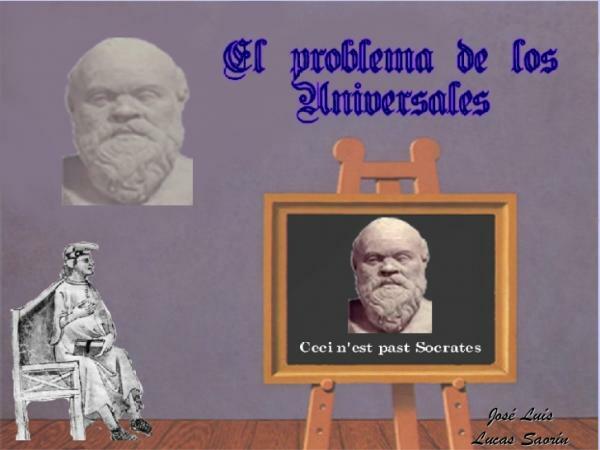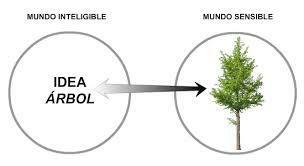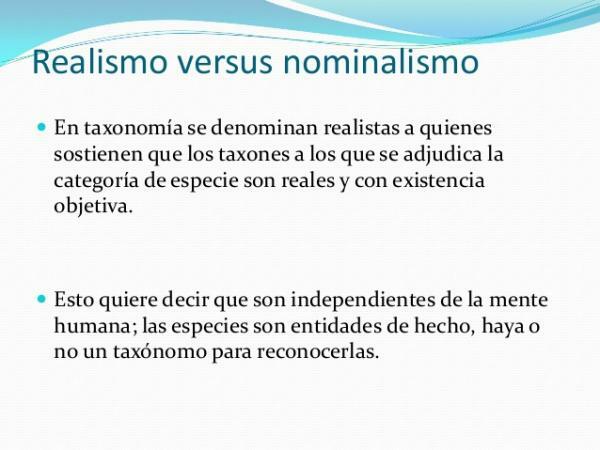The universals debate in philosophy

Image: Slideshare
Could you define the universal term? In this lesson from a TEACHER, we will focus on the debate of universals in philosophy, a question that occupied a large part of the philosophical discussions, from Plato or Aristotle, to Guillermo de Okham, passing through San Agustín or Santo Tomás de Aquino. Universals are conceived as abstract entities, in front of the singular, the particular, that is to say, the concrete things. One of the characteristics of the things of the universals, would be their immutability, unlike the particular things that are subject to change. Therefore, the universals would become the essences of things. If you want to know more about the universals debate in philosophy, continue reading this article. Let's get started! 4
PlatoHe is the first, although there are those who say that it was Heraclitus, to deal with the problem of universals, since all his philosophy starts from the division between the sensible world and the intelligible world. The sensible world
It would be that of particular things, changing, perishable, and is known through the senses. The intelligible world it is that of ideas, that of the universal, and it is prior to the world of the senses, which is nothing more than an imperfect copy of the world of ideas. In Plato's intelligible world, there are the idea of beauty, justice, good, animal, and all the ideas that the sensible world imitates. This upper world can only be known by reason, ascending the scale of knowledge.The platonic realism it becomes radical, by affirming the reality of universals, and by defending the existence of a superior world where they inhabit. This is the only true world. The sensible world, on the other hand, imitates the first one, but it is not real, but mere appearance.
The Myth of the Cave Plato's is an allegory that appears at the beginning of the Book VII of the Republic, and where the philosopher explains his Theory of Ideas. Much of Plato's thought is reflected in this allegory.
Aristotle's proposal
Aristotle, a disciple of Plato, shows his rejection of the Theory of Ideas by affirming that being, the real, is found in particular things and not outside of them. There are no separate ideas of things, nor an intelligible world separated from it. One of the modes of being is the substance, which the stagyrite defines as a compound of matter and form.
Matter is what things are made of, and form is their essence. That is, the matter represents the particular and the form the universal. The universal, for Aristotle, can only be known through the understanding, from a process of abstraction that goes from the particular to the universal, by which the nature of all individuals of the same species can be known, and which is inseparable from things.
Substance is said of simple bodies, such as earth, fire, water, and all the like; and in general, of the bodies, as well as of the animals, of the divine beings that have bodies and of the parts of these bodies… (Aristotle, Metaphysics, book V, 8).

Image: Love of knowledge
The problem of universals was widely discussed throughout the Middle Ages and, in fact, it is at this time that it acquires special significance. One can speak of two opposing currents in the debate of the universals in philosophy: nominalism and realism.
- The nominalism defends the existence of abstract terms or names, but denies the existence of abstract and universal entities, because everything that exists is singular and concrete. There are no universals, only general predicates. There are things that only have the name in common, therefore, that is their essence. The highest representative of nominalism will be Gillermo de Ockham.
- The realism defends the existence of abstract and independent objects and entities of the subject. During the Middle Ages, Plato's ideas were believed to be real.
- The moderate realism, defends the existence of abstract entities but not separated from things. The main representative of moderate realism is Saint Thomas of Aquino, that he postulates that universals constitute the very essence of things, as a metaphysical entity, but they can only be known by abstraction.
Along the same lines is the conceptualism from Pedro Abelardo, which defends the existence of universals separated from things, but only within the mind, as an idea, not as an entity.

Image: Slideshare
Aristotle, Metaphysics, book V. Ed. Gredos
Saint Thomas of Aquino. The Order of Being. Ed. Tecnos
Teodoro de Andrés. William of Ockham's Nominalism as a Philosophy of Language. Ed. Gredos

